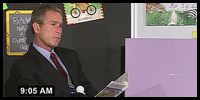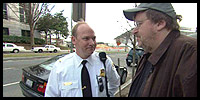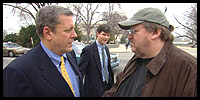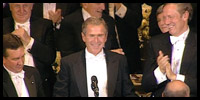
 |
|
Fahrenheit 9/11 (2004) 2004 – 112 minutes Rated: Reviewed by Dustin Putman, June 26, 2004.  In some ways, "Fahrenheit 9/11" defies normal film criticism. The new documentary from filmmaker Michael Moore (2002's "Bowling for Columbine") takes a searing look at the Bush Administration, and figuratively regurgitates in utter disgust at what it finds. There will be no confusion as to what Moore's viewpoint is on President George W. Bush, the U.S. government, and the Iraqi War, and no denying that this film is shameless propaganda. Nonetheless, Moore has obviously done his homework and gone to great lengths to deliver a wholly convincing argument, even if—as has been alleged in the past about Moore's work—some of the footage has been cleverly skewed in the editing room to meet his goals. The majority of the footage speaks for itself, however, and many of the events discussed are hard facts that can't be disputed. Whether one is a Democrat or a Republican, and whether one is for or against Bush, it will be almost impossible for any of them to watch "Fahrenheit 9/11" and not walk away believing that this current U.S. President of ours needs to be thrown out of office as soon as humanly possibly (read: the November 2004 election).
In some ways, "Fahrenheit 9/11" defies normal film criticism. The new documentary from filmmaker Michael Moore (2002's "Bowling for Columbine") takes a searing look at the Bush Administration, and figuratively regurgitates in utter disgust at what it finds. There will be no confusion as to what Moore's viewpoint is on President George W. Bush, the U.S. government, and the Iraqi War, and no denying that this film is shameless propaganda. Nonetheless, Moore has obviously done his homework and gone to great lengths to deliver a wholly convincing argument, even if—as has been alleged in the past about Moore's work—some of the footage has been cleverly skewed in the editing room to meet his goals. The majority of the footage speaks for itself, however, and many of the events discussed are hard facts that can't be disputed. Whether one is a Democrat or a Republican, and whether one is for or against Bush, it will be almost impossible for any of them to watch "Fahrenheit 9/11" and not walk away believing that this current U.S. President of ours needs to be thrown out of office as soon as humanly possibly (read: the November 2004 election).
 Some of "Fahrenheit 9/11" concerns issues that are common knowledge to the American public, such as the fishy 2000 presidential election that originally stated Al Gore led the electoral votes in Florida until the Fox News (run by Bush's first cousin) stated that George W. Bush had narrowly come out on top. While a recount might have, indeed, proved Gore was the winner, none was ever ordered and Bush controversially became the next President of the United States. It is also widely known that Bush lacks intelligence and a firm hold on English grammar and speech (although he does lie awfully well), the source of some of the film's most uproarious moments, but Moore wisely chooses not to overstay his welcome with these easy potshots. Even when the movie is not covering particularly fresh or eye-opening territory, it is consistently enthralling. Michael Moore's passion for these dire political matters carries over into the viewer; his film is laugh-aloud funny, razor sharp, informative, humane, enraging, and staggeringly powerful, oftentimes all of the above at once.
Some of "Fahrenheit 9/11" concerns issues that are common knowledge to the American public, such as the fishy 2000 presidential election that originally stated Al Gore led the electoral votes in Florida until the Fox News (run by Bush's first cousin) stated that George W. Bush had narrowly come out on top. While a recount might have, indeed, proved Gore was the winner, none was ever ordered and Bush controversially became the next President of the United States. It is also widely known that Bush lacks intelligence and a firm hold on English grammar and speech (although he does lie awfully well), the source of some of the film's most uproarious moments, but Moore wisely chooses not to overstay his welcome with these easy potshots. Even when the movie is not covering particularly fresh or eye-opening territory, it is consistently enthralling. Michael Moore's passion for these dire political matters carries over into the viewer; his film is laugh-aloud funny, razor sharp, informative, humane, enraging, and staggeringly powerful, oftentimes all of the above at once.
 Some segments are downright chilling. Moore tastefully places the horrific sound bites of the 9/11 World Trade Center attack over a black screen, and since everyone has the images from this day ingrained in their memory this less-is-more stylistic approach is all the more unsettling. Perhaps the most disquieting footage is of Bush's lost facial expression when he is informed of the second plane crash. At a Florida elementary school meeting with a group of children on the morning of September 11, Bush does nothing even after finding out the country is under attack. He ultimately stays with the tots, reading a children's book to them, for seven more minutes before he is instructed to excuse himself and deal with the matter. The look on Bush's face, one of fear and total confusion, is unforgettably disturbing. In the days following 9/11, when planes were grounded across the country, Bush aided in flying stateside Bin Laden relatives—family friends of Bush's—out of the country without even questioning them. That Bush has admitted to not making an effort in finding Bin Laden and later skimmed over Afghanistan's role in the 9/11 attacks in exchange for a war against a country—Iraq—that had nothing to do with it is maddening.
Some segments are downright chilling. Moore tastefully places the horrific sound bites of the 9/11 World Trade Center attack over a black screen, and since everyone has the images from this day ingrained in their memory this less-is-more stylistic approach is all the more unsettling. Perhaps the most disquieting footage is of Bush's lost facial expression when he is informed of the second plane crash. At a Florida elementary school meeting with a group of children on the morning of September 11, Bush does nothing even after finding out the country is under attack. He ultimately stays with the tots, reading a children's book to them, for seven more minutes before he is instructed to excuse himself and deal with the matter. The look on Bush's face, one of fear and total confusion, is unforgettably disturbing. In the days following 9/11, when planes were grounded across the country, Bush aided in flying stateside Bin Laden relatives—family friends of Bush's—out of the country without even questioning them. That Bush has admitted to not making an effort in finding Bin Laden and later skimmed over Afghanistan's role in the 9/11 attacks in exchange for a war against a country—Iraq—that had nothing to do with it is maddening.
 "Fahrenheit 9/11" also makes a persuasive case regarding the amount of lies and deceit the Bush Administration has been responsible for toward the American public—the raising of terror alert levels and other pseudo crises for the sole intention of scaring citizens into not clearly recognizing their falsehood; the creation of impending danger within Iraq (weapons, for example, that do not exist) simply for the sake of attacking the country and capturing Saddam Hussein; and the flimsy reasons given today for why the war presses on. Moore's effort to narrow in and humanize the life-altering effects of the war fall upon Lila Lipscomb, a woman in Flint, Michigan (Moore's hometown) who is first seen as patriotic and upbeat before she learns of her son's death in the war. Lipscomb is outraged, to say the least, not only because of the loss of her son but because his death could have been prevented. Reading the last letter her son wrote to her, even he is mindboggled as to the justification and motivations behind the war he has been forced to risk his life in.
"Fahrenheit 9/11" also makes a persuasive case regarding the amount of lies and deceit the Bush Administration has been responsible for toward the American public—the raising of terror alert levels and other pseudo crises for the sole intention of scaring citizens into not clearly recognizing their falsehood; the creation of impending danger within Iraq (weapons, for example, that do not exist) simply for the sake of attacking the country and capturing Saddam Hussein; and the flimsy reasons given today for why the war presses on. Moore's effort to narrow in and humanize the life-altering effects of the war fall upon Lila Lipscomb, a woman in Flint, Michigan (Moore's hometown) who is first seen as patriotic and upbeat before she learns of her son's death in the war. Lipscomb is outraged, to say the least, not only because of the loss of her son but because his death could have been prevented. Reading the last letter her son wrote to her, even he is mindboggled as to the justification and motivations behind the war he has been forced to risk his life in.
 If "Fahrenheit 9/11" does not quite match Michael Moore's brilliant last film, "Bowling for Columbine," it is because the latter picture was more emphatic and encompassing in its intricately woven study of gun violence in America, while this new effort was clearly rushed to completion to beat the November elections. Even in a somewhat rougher form than Moore is accustomed to, however, "Fahrenheit 9/11" is an important documentary and a spellbinding entertainment, one that does not throw up false pretenses or preach. And despite a small amount of the footage calling attention to itself in that it very well could have been taken out of context or tinkered with in the editing room, the majority is undeniably factual and unquestionably despairing.
If "Fahrenheit 9/11" does not quite match Michael Moore's brilliant last film, "Bowling for Columbine," it is because the latter picture was more emphatic and encompassing in its intricately woven study of gun violence in America, while this new effort was clearly rushed to completion to beat the November elections. Even in a somewhat rougher form than Moore is accustomed to, however, "Fahrenheit 9/11" is an important documentary and a spellbinding entertainment, one that does not throw up false pretenses or preach. And despite a small amount of the footage calling attention to itself in that it very well could have been taken out of context or tinkered with in the editing room, the majority is undeniably factual and unquestionably despairing.
 "Fahrenheit 9/11" may rightfully be cynical of the Bush Administration—the country will be in trouble if Bush is reelected and the government and congress itself are jokes (bills are rarely ever read by the people who sign them)—but the film itself is refreshingly hopeful, even if said positivism is mere wishful thinking. Michael Moore presents himself as having confidence in this country; he is definitely pro-American, regardless of what his naysayers may think, and so the lasting effect of the film is not without a silver lining. If there is going to be a non-fiction filmmaker today who is known for calling people on their hypocrisy and mistakes, Moore reigns supreme. Since 1989's "Roger & Me," Moore has excelled at showing audiences just how versatile, touching, and absorbing the documentary format can be. "Fahrenheit 9/11" does not disappoint.
"Fahrenheit 9/11" may rightfully be cynical of the Bush Administration—the country will be in trouble if Bush is reelected and the government and congress itself are jokes (bills are rarely ever read by the people who sign them)—but the film itself is refreshingly hopeful, even if said positivism is mere wishful thinking. Michael Moore presents himself as having confidence in this country; he is definitely pro-American, regardless of what his naysayers may think, and so the lasting effect of the film is not without a silver lining. If there is going to be a non-fiction filmmaker today who is known for calling people on their hypocrisy and mistakes, Moore reigns supreme. Since 1989's "Roger & Me," Moore has excelled at showing audiences just how versatile, touching, and absorbing the documentary format can be. "Fahrenheit 9/11" does not disappoint.
|
© 2004 by Dustin Putman |














